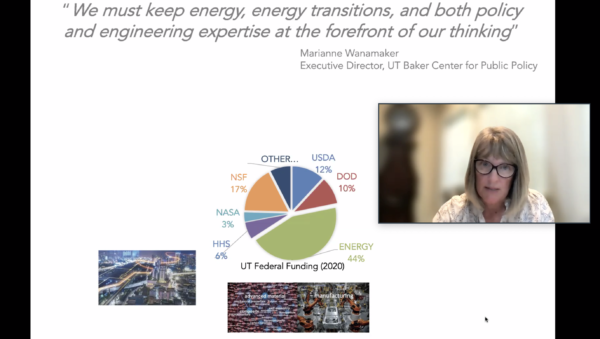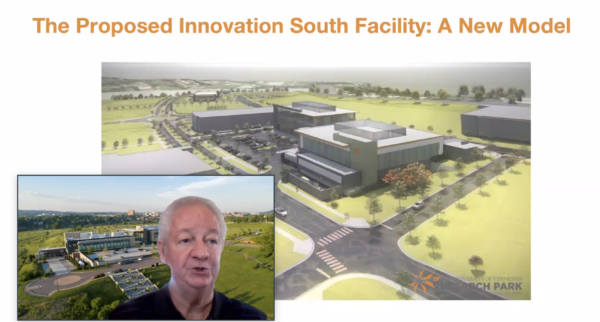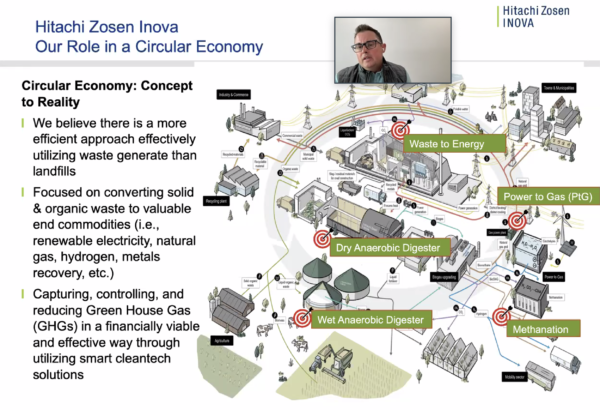On October 13, the Tennessee Advanced Energy Business Council hosted an East Tennessee-focused webinar, serving as the third and final roundtable of the year. During the event, speakers discussed higher education resources, upcoming entrepreneur accelerators, and the strategies behind evolving the energy economy.
The hour-long webinar was moderated by TAEBC Executive Director, Cortney Piper. The virtual discussion involved several key voices in the East Tennessee energy realm:
Vice Chancellor of Research, Deborah Crawford; ORNL Manager of Industrial Partnerships and Economic Development, Jesse Smith; University of Tennessee Research Park CEO, Tom Rogers; Tennessee Board of Regents’ Chancellor, Flora Tydings; TICUA President, Claude Pressnell; Managing Director Heath Jones at Hitachi Zosen Inova USA; and Volkswagen USA Director of Sales, Dustin Krause.
There has been a tide of progress sweeping over Tennessee with the recent Ford announcement – signalling East Tennessee as a frontrunner in the electric vehicle supply chain.
“Advanced energy is technology neutral for us,” said Piper. “Anything that makes energy cleaner, safer, more secure, more efficient – it’s in the tent, and it includes electricity and transportation.” The focused mission of TAEBC to promote advanced energy as an economic developer and job creation catalyst launched the dynamic discussion among the seven represented speakers.
The University of Tennessee and ORNL’s role in creating and excelling experts in the advanced energy economy
 First, Vice Chancellor Deborah Crawford commenced the event with a discussion on how the University of Tennessee utilizes research, scholarship, and creativity to promote a sustainable future. Crawford shared the university’s extensive research portfolio in the effort to train up stakeholders to pose Tennessee as the advanced energy state in the twenty-first century.
First, Vice Chancellor Deborah Crawford commenced the event with a discussion on how the University of Tennessee utilizes research, scholarship, and creativity to promote a sustainable future. Crawford shared the university’s extensive research portfolio in the effort to train up stakeholders to pose Tennessee as the advanced energy state in the twenty-first century.
“Out of the federal funding that UT expended in fiscal year 2020, forty-four percent of that funding came from the Department of Energy, and was very focused on advanced energy solutions. We are an advanced energy university,” said Crawford.
Jesse Smith followed Crawford’s presentation, speaking to the industrial partnerships and economic developments at the Oak Ridge National Laboratory. Smith connects external audiences with researchers and resources within the lab to solve problems and launch new projects – from energy storage and battery innovation to 3D manufacturing.
Smith spoke to the lab’s involvement with Innovation Crossroads and the resources available through the program by explaining, “Companies all across the U.S. can apply to work here for two years and get the expertise needed to move their start-up company through that valley of death and get them closer to launching a full blown company.”
DOE Cleantech Accelerator Announcement
 The expert insight continued as Tom Rogers from The University of Tennessee’s Research Park shared the organization’s vision to connect research assets with established companies and promising startups through their new proposed facilities.
The expert insight continued as Tom Rogers from The University of Tennessee’s Research Park shared the organization’s vision to connect research assets with established companies and promising startups through their new proposed facilities.
“We are one of the few regions in the country that have three business accelerators focused on energy and hard technology. But if we don’t take purposeful steps to make sure that the companies who come here participate in those programs stay here – we will have missed a big economic opportunity,” said Rogers.
The research park launched the Spark Innovation Center to help promote the innovation sustainability in East Tennessee. During the webinar, Rogers announced the newly granted Department of Energy Award to initiate a Spark Cleantech Accelerator in June of 2022.
“Next June, in partnership with TAEBC, and with Launch Tennessee and the support of TVA, we will be conducting a three month program with the Energy Mentor Network. We hope to work with you to provide the participants of our accelerator with some market intelligence and guidance to grow new companies – which will then hopefully remain in Tennessee for the long-run.”
Warranty-backed advance energy education
 Flora Tydings followed the announcement by reiterating the mission of the Tennessee Board of Regents: student success and workforce development.
Flora Tydings followed the announcement by reiterating the mission of the Tennessee Board of Regents: student success and workforce development.
Over the last several years, over forty-one thousand students were enrolled in advanced energy programs. A total of one hundred and sixty-one programs are currently running in the East Tennessee region.
“If you graduate from one of our technical programs of study, we do actually issue a warranty on our graduates. If within one year of graduation, a student does not have the skills for which we have said we trained them – and an employer verifies that – we will take that student back and re-train them for free,” said Tydings.
The Tennessee Board of Regents has a vision to provide a trained workforce, adding to the 400,000 advanced energy jobs in the state.
TICUA President Claude Pressnell then shared the organization’s notable progress in advancing East Tennessee as an innovative regional leader.
“Don’t forget about your local colleges – they have the ability to pivot rather quickly in terms of academic offerings and engaging faculty in those science and research areas.”
As developments in the technical workforce continue to develop, TICUA seeks to serve as a fluid system to interact with the developing demands of advancements and evolutions in the Tennessee energy ecosystem.
Evolving the energy economy
 The virtual roundtable then transitioned to Heath Jones, Managing Director at Hitachi Zosen INOVA, for a deep-dive into their waste to energy division focused on renewable energy.
The virtual roundtable then transitioned to Heath Jones, Managing Director at Hitachi Zosen INOVA, for a deep-dive into their waste to energy division focused on renewable energy.
“We’re focused on converting organic and solid waste into more valuable and used commodities – renewable electricity, natural gas, hydrogen, or metals recovery. We really want to capture and control those greenhouse gases in a financially viable and efficient way through cleantech,” said Jones. HZI’s intends to play a vital role in the circular economy – bringing conceptual innovations to reality by leveraging East Tennessee’s synergy of materials and energy innovation infrastructure to showcase talent.
 Dustin Krause, Director of e-Mobility at Volkswagen North America concluded the event by highlighting the massive impact Volkswagen has had in Chattanooga and the surrounding region.
Dustin Krause, Director of e-Mobility at Volkswagen North America concluded the event by highlighting the massive impact Volkswagen has had in Chattanooga and the surrounding region.
“We’ve now invested billions of dollars into our production facility in Chattanooga, and we are doubling down that investment by bringing electric mobility to the United States in production at the Chattanooga facility.”
Krause spoke to the technical innovation touted by VW, but also to the strategic partnerships with local entities to create sustainable products and job positions in the East Tennessee region.
The roundtable concluded with an audience Q&A, allowing attendees to glean further insight from the presenters. During the Q&A, questions were posed on a range of topics relating to TAEBC’s impact goals, electric vehicle charging accessibility, and the need for technical training to bolster the advanced energy industry and economy.
“Electrification is right here on our doorstep, autonomy is not far behind. And as we look at increasing autonomy in our transportation systems, and as we look at the impact of technologies like artificial intelligence and machine learning – we are going to be asking our workforce in many sectors to develop skills that they probably don’t have today. And so that means taking a comprehensive look at the way we prepare our graduates at all levels – high school through Ph.D – and think about how we prepare them to be life-long learners,” said Deborah Crawford.
TAEBC serves as an all-encompassing connector – welcoming businesses and researcher partners to join the plight to generate cutting edge innovations in the advanced energy economy.
To watch or rewatch the event, please follow this link.
Loved the event? Missed the event? Sign up for our newsletter to learn more about our members, advanced energy news and upcoming events. Also, if you’re not already a member, become a member today!

 First, Vice Chancellor Deborah Crawford commenced the event with a discussion on how the
First, Vice Chancellor Deborah Crawford commenced the event with a discussion on how the  The expert insight continued as Tom Rogers from
The expert insight continued as Tom Rogers from  Flora Tydings followed the announcement by reiterating the mission of the
Flora Tydings followed the announcement by reiterating the mission of the  The virtual roundtable then transitioned to Heath Jones, Managing Director at
The virtual roundtable then transitioned to Heath Jones, Managing Director at  Dustin Krause, Director of e-Mobility at
Dustin Krause, Director of e-Mobility at